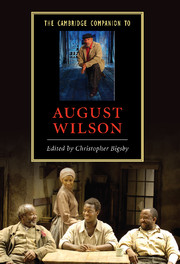Book contents
- Frontmatter
- 1 August Wilson: the ground on which he stood
- 2 Been here and gone
- 3 August Wilson’s relationship to black theatre: community, aesthetics, history and race
- 4 Music and mythology in August Wilson’s plays
- 5 Gem of the Ocean and the redemptive power of history
- 6 Joe Turner’s Come and Gone
- 7 Ma Rainey’s Black Bottom: cutting the historical record, dramatizing a blues CD
- 8 A piano and its history: family and transcending family
- 9 The tragedy of Seven Guitars
- 10 Safe at home?: August Wilson’s Fences
- 11 Two Trains Running: blood on the tracks
- 12 Jitney, folklore and responsibility
- 13 King Hedley II: in the midst of all this death
- 14 Radio Golf: the courage of his convictions - survival, success and spirituality
- 15 Critics on August Wilson
- 16 An interview with August Wilson
- Index
4 - Music and mythology in August Wilson’s plays
Published online by Cambridge University Press: 28 January 2008
- Frontmatter
- 1 August Wilson: the ground on which he stood
- 2 Been here and gone
- 3 August Wilson’s relationship to black theatre: community, aesthetics, history and race
- 4 Music and mythology in August Wilson’s plays
- 5 Gem of the Ocean and the redemptive power of history
- 6 Joe Turner’s Come and Gone
- 7 Ma Rainey’s Black Bottom: cutting the historical record, dramatizing a blues CD
- 8 A piano and its history: family and transcending family
- 9 The tragedy of Seven Guitars
- 10 Safe at home?: August Wilson’s Fences
- 11 Two Trains Running: blood on the tracks
- 12 Jitney, folklore and responsibility
- 13 King Hedley II: in the midst of all this death
- 14 Radio Golf: the courage of his convictions - survival, success and spirituality
- 15 Critics on August Wilson
- 16 An interview with August Wilson
- Index
Summary
August Wilson has often been described as a dramatic historian because of his quest to document the experiences of African Americans in the twentieth century. In truth, though, he is no more a historian than Shakespeare. Given that he chose to set each of his plays in a different decade of the twentieth century, history clearly constitutes the context in which his characters live their lives, but it is those lives that he places centre stage, not the public events which defined those decades. He had altogether a different version of history in mind, one which sank its roots in mythology. It is there that he looked for the symbols, metaphors and tales that embodied and expressed the hopes, fears, aspirations, and religious and civic yearnings of communities who laid down their true history in legends, poems, songs, prayers and, in Wilson's hands, plays.
Wilson was alive to, and tapped into, African myths, often codified in music. He was a storyteller recounting the history of his people but, as he was aware, he was not alone in that. In some senses he played the role performed by the griot in West Africa whose function it was and is to recount the history of his tribe and thereby to preserve and celebrate it. In an African context history is deeply implicated in storytelling, song and myth.
Wilson was in this tradition. Devoid of their mythological dimensions, his characters, Levee, Troy and Boy Willie, in their separate plays, are merely destructive forces at odds with their world instead of agents of change challenging the status quo and reordering their universe. Within the full context of their cultural ancestry, they are the warrior spirit reincarnations of self-empowered trickster deities, figures which recur in myths from the Yoruban Eshu to the Hindu Krishna, from Bamapana the Australian Aborigine, Prometheus in ancient Greece and Sun Wukong in Chinese lore, to Reynard the French fox, Coyote the Native American, Maui in Hawaii, Susanowo in Japan, Loki the Norse god and even Jacob of the Old Testament.
- Type
- Chapter
- Information
- The Cambridge Companion to August Wilson , pp. 65 - 74Publisher: Cambridge University PressPrint publication year: 2007

